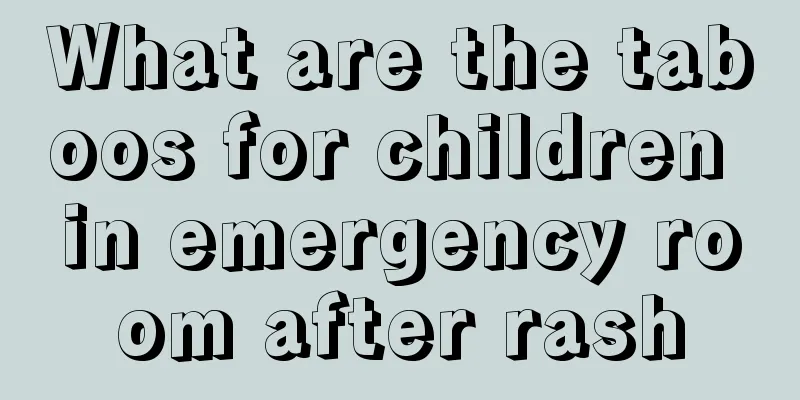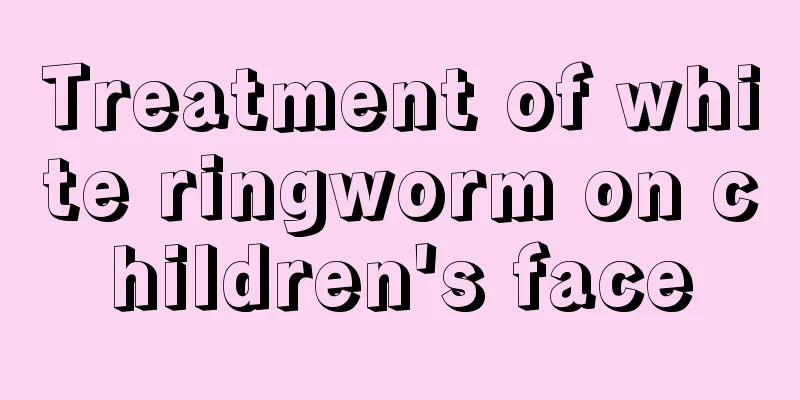What are the taboos for children in emergency room after rash

|
Children have weak immunity and resistance, and they can easily get sick if their parents do not take proper care of them. Among them, roseola infantum is a very common disease in infants. Its main symptoms include fever, small red rashes on the skin, accompanied by nausea, diarrhea, etc. This article introduces how to deal with the onset of roseola infantum. Parents can learn about it together. Roseola infantum, also known as roseola infantum, is an acute infectious disease with sudden febrile illness in children caused by a virus. In ancient China, it was also called milk rash and pseudomeasles. Nursing should be the key to treating infantile rash Roseola infantum mostly occurs in infants and young children aged 6 to 18 months. The disease often develops suddenly, with a rapid rise in body temperature, usually between 39°C and 40°C. Severe patients with high fever in the early stages may have convulsions, and some may experience mild runny nose, cough, eyelid swelling, and conjunctivitis. During the fever period, there are symptoms such as poor appetite, nausea, vomiting, mild diarrhea or constipation, as well as congestion in the pharynx and swollen lymph nodes in the neck. After three to five days of fever, the body temperature drops suddenly. After the fever subsides, the child may develop light red macules or maculopapules of varying sizes all over the body, starting from the chest and abdomen and quickly spreading to the whole body. At this time, the child's fever has subsided and he can fall asleep peacefully. This is medically called "fever rash", which is a unique manifestation of roseola infantum. "Heat rash" should be treated by physical cooling first Young children suffering from roseola generally do not need special treatment. As long as they receive intensive care and appropriate symptomatic treatment, they will recover on their own after a few days. After a child is diagnosed with roseola infantum, parents should let the child rest in bed, try to reduce the number of outdoor activities, and pay attention to isolation to avoid cross infection. When a child has a fever, he should be given plenty of water, easily digestible food, and appropriate supplements of vitamin B and vitamin C. If the body temperature is high and the child is crying and irritable, physical cooling or a small amount of antipyretic drugs can be used to avoid convulsions. When a young mother encounters this situation, she should not rush to reduce her child's fever. Instead, she should check her child's vaccination status and cooperate with the doctor's treatment. Post-rash care for infants 1. Babies should rest more, avoid intense play, suspend physical exercise, and avoid cold water; 2. Drink plenty of water and add appropriate amount of fruit juice, which can increase the intake of vitamins, facilitate sweating and urination, and promote the excretion of toxins; 3. During the baby's illness, he should eat easily digestible food. Babies who can already eat solid food can eat liquid or semi-liquid food at this time. But be careful to make sure it is nutritious (it is not recommended to drink sweetened water with high sugar content, as it will affect the baby's appetite at this time); 4. Deliberately and appropriately supplement vitamin C and vitamin B; 5. The place where the baby rests should be quiet, with good ventilation and fresh air; 6. The quilt should not be too thick or too much, as this will not be conducive to heat dissipation; 7. Keep the baby's skin clean and hygienic. Use clean water to clean the baby and do not break the rash. Also wipe the sweat off the baby's body frequently to prevent the baby from catching a cold and preventing the baby from getting infected. Breastfeeding mothers should not eat seafood. 8. When the body temperature exceeds 39 degrees, you can use warm water or 37% alcohol to wipe the child's body to prevent high fever convulsions (alcohol is not recommended for cooling down babies. If parents do not know the alcohol concentration, it is not recommended to use it for older babies as it is irritating to the skin). 9. Roseola infantum is one of the few diseases where you can go out to play in the wind if you have a rash. However, Chinese medicine believes that your baby is physically weak at this time. If your baby sweats a lot, it is not recommended to go out in the wind. 10. At this time, some babies may be very dependent on their mothers and hope to stay in their mothers' arms all the time. This may be a psychological need of the baby caused by the disease. So please mothers try to meet your baby's psychological needs, which is also beneficial to the parent-child relationship; 11. Babies generally do not feel itchy after the rash appears, but a few babies will feel itchy. Babies who do not feel itchy can ignore it. It will disappear naturally in one to two days without leaving any pigmentation spots or desquamation. Babies who feel itchy can apply hydrogen peroxide ointment or calamine lotion externally. Just wait for the rash to subside and don't worry too much. |
<<: What's the matter with the little pimple on the child's neck?
>>: Children's chest tightness, shortness of breath, and breathing difficulties
Recommend
Why does drinking breast milk cause diarrhea?
Why does drinking breast milk cause diarrhea? If ...
What should I do if my child has bronchial pneumonia and coughs for a long time?
Generally, bronchopneumonia is a common respirato...
Is hyperactivity in children due to zinc deficiency and how to supplement zinc
Recently, many children have shown signs of hyper...
How to treat tonsillitis in children
Children are the apple of their mother’s eye and ...
What should I do if my child has cervical dislocation?
Children's bodies are still in the process of...
Why do children urinate frequently during the day?
Many children have certain problems with frequent...
Why does a three-month-old baby cry before going to bed?
First of all, babies cannot speak, so as long as ...
What to do if your child's lower eyelid turns blue
From the time a child is born to the time he grow...
How to add complementary food to a 14-month-old baby
As babies grow up little by little, the nutrition...
What causes left chest pain in children?
Children's resistance is not as strong as tha...
Can nine-month-old babies eat winter melon?
If a nine-month-old baby has no gastrointestinal ...
Symptoms of lead poisoning in children
Children are the most innocent creatures in the w...
Can baby's thick eyelids become double eyelids?
The baby's double eyelids and single eyelids ...
What are the laxatives for children?
Many children are born with bad gastrointestinal ...
How tall is the baby at one and a half years old
Every parent is always afraid that their baby wil...









